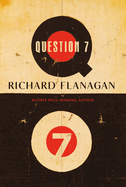
Ten years after winning the Booker Prize for The Narrow Road to the Deep North, Richard Flanagan revisits his father's time as a prisoner of war. It's the starting point but ultimately just one thread in Question 7, an astonishing and uncategorizable work that combines family memoir, biography, and history to examine how love and memory endure.
In 1945, while Flanagan's father was an enslaved laborer in Japan, the U.S. dropped an atomic bomb on Hiroshima, killing at least 60,000 people. The physicist Leo Szilard, who invented and patented the concept of nuclear chain reaction, was inspired to do so by H.G. Wells's prescient novel The World Set Free. Wells had modeled the Martians' actions in The War of the Worlds on the colonization of Tasmania and the genocide of its Aboriginal people. Flanagan grew up in the Tasmanian rain forest--now nearly obliterated--and his father's wartime trauma left him so repressed that he told Flanagan he loved him only on his deathbed.
A full circle; a chain of contingency. The unlikelihood of Flanagan's existence, given his near-death experience at age 21, underpins his marveling at the chance and tragedy of life. His book's title references a short story by Anton Chekhov that asks, "Who loves longer?" If the precise connections between Wells's affair with Rebecca West, the Tsar Bomba, and Boris Johnson--a few links along the book's free-association sequence--remain cryptic, Flanagan's ambition can nonetheless only be admired. As he repeats, "Experience is but a moment. Making sense of that moment is a life." Memories into meaning: that's a memoirist's job well done. --Rebecca Foster, freelance reviewer, proofreader and blogger at Bookish Beck

